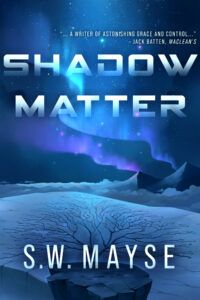Love after the (intergalactic) war
Shadow Matter
by S.W. Mayse
Calgary: Tyche Books, 2023
$24.99 / 9781989407554
Reviewed by Zoe McKenna
*

The war is over. “Too late to fight and too soon to mourn,” Seren finds herself detained by a strange, brutish pilot calling himself Damou. A Politaya videographer, Seren was tasked to bring essential data back to her Fleet so that she might return to civilian life and find her family. This dream is now lost, as is the data she was meant to convey and her memories of the past few days. Thus begins Shadow Matter.
Vancouver Island-based S.W. Mayse is no stranger to writing, with titles to her name including a historical novel, Awen, a political thriller, Merlin’s Web, and a nonfiction biography of Albert “Ginger” Goodwin.
Before becoming an author, Mayse worked in a salmon cannery, as a reporter, a DJ, photographer, television researcher-writer, and a book scout. Mayse’s has nearly as many accolades as she has had careers, boasting the Edna Staebler Award for Creative Non-Fiction, the Arthur Ellis Award for best true crime, and the Georgette Heyer Award for Historical Fiction in England (shortlisted), amongst others.

With an oeuvre brimming with topics ranging from ancient poetry cycles to Welsh nationalists, it’s only logical that Mayse’s next output be Shadow Matter—a retelling of the Greek myth of Orpheus and Euridice set in intergalactic space.
Shadow Matter begins in media res, which is both exciting and off-putting. Readers are introduced to Mayse’s intricate universe through Seren’s eyes, and, grappling with the loss of her memory, family, data, and the war, Seren’s perspective is more than a little disoriented. It is unclear at first how Seren fits into the ecosystem of characters that populate the first few pages.
Mayse’s universe contains various sects of people across multiple planets. The world-building is complex, as indicated by a guide to characters (divided by their sect or group) at the beginning of the novel, and a hefty glossary at the end.
This supplementary material that bookends the novel also illustrates the degree to which Shadow Matter’s pages offer something for everyone. While lengthy, the book’s pace is lightning fast and overflowing with detail. Mayse knits together themes and topics that are political, artistic, romantic, and more. This not only makes the first read exhilarating—each page is a gift—but readers who enjoy revisiting novels are sure to find something new to explore on a second visit to the book.
While the first few chapters are a lot to reckon with, Mayse’s choice to throw readers in at the deep end serves to strengthen the connection to Seren. Headstrong but heartfelt, Seren leads the story, but secondary characters are afforded careful attention throughout. As the story continues, Mayse’s character development is both elegant and evocative. This skillful approach becomes essential, as there are many characters to keep tabs on scattered across different civilizations and historical epochs.
The large cast—alongside the animals, technology, and history, and politics of Mayse’s universe—creates the potential to lose sight of key players and plot lines. But Mayse ensures that this is never the case.
Characters and their relationships take precedence throughout the story, especially when it comes to Seren and Damou. Shadow Matter is described as a retelling of the Orpheus and Euridice myth, so it is no surprise that the two protagonists fall in love. What is pleasantly surprising is how tactfully the relationship is developed, maintaining each character’s nuance in the process.
In reflecting on the great science fiction stories of our time, it is the relationships at the forefront of the action that charm audiences and drive connections within a scenario set decades or centuries into the future. Continuing in this tradition, Mayse develops a romance between the two protagonists that works to strengthen—and not detract from—the galactic war story line. Rather, the romance breathes new life into the science fiction, and Mayse illuminates the violence of war and the tenderness of love as two, interconnected sides of the human coin.
The embrace of the Orpheus myth to underscore Seren and Damou’s relationship is just one way in which Mayse explores the necessary and inseparable connection between art and sciences. Each of Seren’s chapters open with a camera angle notation, as if in a script: “moving shot, hover,” “freeze frame.” These additions not only give readers an insight into Seren’s emotions, but serve as constant reminders of how, despite violence and danger, art is never far from Seren’s thoughts.
Elsewhere, art is woven into the story more subtly. We may not yet consider computer generated avatars to be creative masterpieces, but in Shadow Matter the avatars that Seren creates permeate the boundary between life and death. Seren uses this technology to maintain the image of those she has loved in a fashion not dissimilar to that of the distressing and heartfelt death photography of the Victorian era. In this, Shadow Matter illustrates the power of art and creativity, all the more so in dire times.
Shadow Matter’s historical considerations are not limited to Greek stories, as Mayse manages to evoke some of our earliest examples of science fiction. In its embrace of creativity, art, the natural world, and the ways in which bodies can be destroyed and rebuilt through technology, Shadow Matter rings of Mary Shelley’s Frankenstein. It’s clear that Mayse is keenly aware of the long history of the genre and is mindful of how she contributes to it.
The clear connection between the Orpheus myth, Frankenstein, and Shadow Matter is the emphasis on humans and humanity. While Shadow Matter is highly technical, political, and complex science fiction, it is ultimately a study in people, and the ways we help and harm each other—regardless of which planet or timeline we find ourselves in.
*

Zoe McKenna holds a MA from the UVic and a BA from VIU. Her thesis, as well as a great deal of her other reading and writing, focuses on horror writing in Canada, especially that by BIPOC authors. Her previous work has appeared in VIU’s Portal Magazine and Quill & Quire. When not reading, writing, or reviewing, Zoe can be found hiking a local mountain or in front of a movie with her two cats, Florence and Delilah. She is always covered in cat hair and wears almost exclusively dark clothing to prove it. Find her on Twitter. [Editor’s note: Zoe McKenna has reviewed books by Linda Cheng, Paul Cresey, Michelle Min Sterling, Eve Lazarus, David Wallace, David Ly & Daniel Zomparelli, Sophie Sullivan, kc dyer, Robyn Harding, and Lindsay Cameron for BCR.]
*
The British Columbia Review
Interim Editors, 2023-25: Trevor Marc Hughes (non-fiction), Brett Josef Grubisic (fiction)
Publisher: Richard Mackie
Formerly The Ormsby Review, The British Columbia Review is an on-line book review and journal service for BC writers and readers. The Advisory Board now consists of Jean Barman, Wade Davis, Robin Fisher, Barry Gough, Hugh Johnston, Kathy Mezei, Patricia Roy, Maria Tippett, and Graeme Wynn. Provincial Government Patron (since September 2018): Creative BC. Honorary Patron: Yosef Wosk. Scholarly Patron: SFU Graduate Liberal Studies. The British Columbia Review was founded in 2016 by Richard Mackie and Alan Twigg.
“Only connect.” – E.M. Forster
6 comments on “Love after the (intergalactic) war”